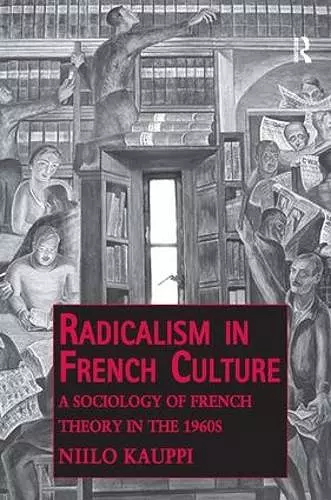Radicalism in French Culture
A Sociology of French Theory in the 1960s
Format:Hardback
Publisher:Taylor & Francis Ltd
Published:11th Nov '10
Currently unavailable, and unfortunately no date known when it will be back
This hardback is available in another edition too:
- Paperback£51.99(9781138257764)

An invisible pattern draws together most studies dealing with French cultural radicalism in the 1960s with intellectual creation reduced to individual creation and the role of semiotic and social factors that influence intellectual innovation minimized. Sociological approaches often see a more or less external link between social location and intellectual production but, because of their structural approach, they are incapable of taking into account unique historical circumstances, the crucial role of personal impulses, and more importantly the semiotic logic of ideas as conditions of innovative thinking. This ground-breaking book will further an internal sociological analysis of ideas and styles of thought. It will show that the defining but largely neglected feature of what has become "French theory" was a collective mind and style of thought, an explosive but fragile mixture of scientific and political radicalism that rather quickly watered down to academic orthodoxy. For some time, radical intellectuals succeeded in producing ideas that were perfectly in tune with the demands of the consumers, mostly the young university audience. Ideas were used as part of radical posture that was set in opposition to the establishment and "those in power". Ideas could not be too empirical or verifiable, and they had to shock. It is not surprising that a slew of new sciences and concepts were invented to indicate this radical posture. The central argument of this study is that ideas become "power-ideas" only if they succeed in uniting individual and collective psychic investment in powerful social networks with significant institutional and political backing. These conditions were met in the French context for a certain specific period of time. From roughly the mid-1960s to the beginning of the 1970s, radical intellectuals such as Roland Barthes, Pierre Bourdieu, Jacques Derrida, Michel Foucault, Julia Kristeva developed a host of new ideas, concepts and theories, a number of which have subsequently been labelled as French theory.
'A welcome addition to the ever growing attempts to interpret the vast and enduring importance of French Theory - and one that, for the first time, puts Julia Kristeva in the central place from which others have excluded her. Recommended strongly for all who care about social theory and want to understand it.' Charles Lemert, Wesleyan University, USA '"French Theory" has exerted enormous international influence since the 60s and the ripple effects are felt throughout literary and critical studies, social theory, and Left politics. But many of those influenced have only fuzzy knowledge of its origins and its shaping context in the intellectual field of the 1960s. Radicalism in French Culture is a terrific guide providing a model for analyzing the relationship among political and intellectual movements and larger cultural fields.' Craig Calhoun, President, Social Science Research Council , USA '... the arguments that Kauppi presents here are interesting and provocative... Kauppi's project in Radicalism in French Culture is a significant one...' Radical Philosophy 'Niilo Kauppi, himself a former student of Bourdieu, has written a rich sociological study of the workings of knowledge production in Paris in the late 1960s, reconnecting familiar names and ideas both to each other, and to the fabric of the field that enabled their interaction... Kauppi's book represents a truly pioneering attempt to reconstruct theory in terms of its local political life.' Marx & Philosophy '... this book is a welcome addition to the ever increasing attempts to understands the immense and continuing importance of French theory, and one that, for the first time, puts Julia Kristeva in the central place. I would highly recommend this book for those who are keen to understand French social theory and especially for those interested in culture and society, in that arts in particular.' Irish Journal of Sociology 'Kauppi’s sociological treatment of structuralism proves illuminating on
ISBN: 9781409407836
Dimensions: unknown
Weight: 453g
164 pages